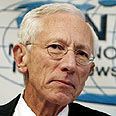
Fischer: Haredim must change habits
Bank of Israel chief calls on ultra-Orthodox community to help efforts to decrease poverty rates by increasing its part in workforce; predicts global financial crisis will temper in mid 2009
Bank of Israel Governor Stanley Fischer said Wednesday that he foresees an improvement in the global financial market sometime around the second half of 2009.
Fischer added that the Bank of Israel will continue its policy of decreasing the interest rates, in accordance to the government goal of keeping the inflation rates around 1%-3%.
Speaking at the closing panel of the 2008 United Jewish Communities' General Assembly in Jerusalem, Fischer also noted that the Bank of Israel was fully prepared to back the banking system and that it was gearing to do everything needed to support the stability of the various banks in Israel.
Israel's open economy policy means that the country cannot isolate itself from the situation affecting the global market, he said, and so the local economy will have to pay a price, just like other Western economies.
Nevertheless, Israel's financial state going into these tumultuous times was good, since the local banking system – which has always led solid mortgage policies – was relatively unaffected by the sub-prime mortgage crisis which hit the US.
Israel's economy, he told his audience, has three major challenges to deal with in the future: Decreasing poverty rates, boosting the education system and maintaining the success enjoyed by the high-tech industry.
The ratio between Israel's defense expenditures and its gross national product (GNP) is three times higher that in any other Western country; but Israel's defense expenditures may increase further once peace is struck, as more funds would be needed to establish the new borders.
As for decreasing poverty rates, Fischer noted that the ultra-Orthodox community would have to take an active part in that effort, by having more of its members join the workforce. Today, he added, only 25% of the community contributed to the workforce.
The State Budget for 2009 is a responsible one, he said, but nevertheless, it is unlikely that it would be approved before April or May – after the general elections.
The full effect of the government's post-crisis financial plan, concluded Fischer, is still months away from becoming evident.










